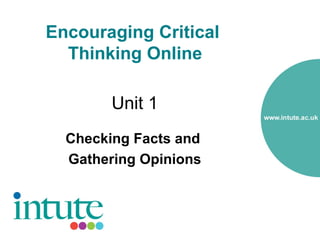
Critical Thinking Unit 1 Question A3 Ww2 Slide Share
- 1. Encouraging Critical Thinking Online Unit 1 Checking Facts and Gathering Opinions
- 2. On what date did World War II start? • Find three websites that provide an answer • Fill in the boxes on the worksheet for each of them • Comment on any notable features of the sites or answers you discover
- 3. On what date did World War II start? • The answer depends on how one interprets the question – What constitutes the true beginning of a war? – Whose perspective are we considering events from?
- 4. On what date did World War II start? • Popular answers include 1 September 1939, when Germany invaded Poland, and 3 September 1939, when Britain and France declared war on Germany
- 5. On what date did World War II start? • However, there are arguments for both earlier and later dates – Hostilities in Asia began earlier in the 1930s – Some argue it wasn’t a true world war until the USA became involved in 1941
- 6. Extract from U-S-History.com Extract from Wikipedia article on World War II http://www.u-s-history.com/pages/h1661.html and http://en.wikipedia.org/wiki/World_War_II#Chronology Retrieved 7 August 2008
- 7. Wikipedia article notes http://en.wikipedia.org/wiki/World_War_II#References Retrieved 7 August 2008
- 8. Wikipedia article notes http://en.wikipedia.org/wiki/World_War_II#References Retrieved 7 August 2008
- 9. On what date did World War II start? • Searches for phrases like “ World War II start date” or “ When did World War II start?” bring up a range of results – Question and answer sites – Essays and overviews
- 10. Results of Google search for “When did World War II start?” http://www.google.co.uk/ Retrieved 7 August 2008
- 11. A Yahoo! Answers page http://answers.yahoo.com/question/index?qid=20060620173709AA7G8pe Retrieved 5 June 2008
- 12. On what date did World War II start? • However, notice that a search like this produces a high proportion of non- scholarly results • Q&A sites give a range of answers – but some of those answers are wrong! – See, for example, this WikiAnswers page • A lot of sifting and evaluation is required
- 13. WikiAnswers: the second hit for the Google search “World War II start date” http://wiki.answers.com/Q/What_exact_time_and_date_did_world_war_2_start Retrieved 4 June 2008
- 14. WikiAnswers: the second hit for the Google search “World War II start date” http://wiki.answers.com/Q/What_exact_time_and_date_did_world_war_2_start Retrieved 4 June 2008
- 15. On what date did World War II start? • Because there’s no clear single answer, more scholarly sites may not specify a start date – Therefore they may not show up in a search using this phrase • Careful choice of search terms is vital
- 16. On what date did World War II start? • Searching for a phrase like “ World War II timeline” produces a rather different set of results – More sites devoted to history – More sites intended for academic use – But not all sites are equal – there’s still a need for careful selection
- 17. Results of Google search for “World War II timeline” http://www.google.co.uk/ Retrieved 7 August 2008
- 18. Extract from BBC History website http://www.bbc.co.uk/history/worldwars/wwtwo/ww2_summary_01.shtml Retrieved 7 August 2008
- 19. Summary - key things to note • Sometimes it’s necessary to discover part of the answer to enable effective searching for the rest • The nature of some sites may make them more prone to error
- 20. Why might we find conflicting answers to a question? • There may be real uncertainty about the answer • Authorities may disagree • There may be multiple ways of interpreting a question
- 21. Why might we find conflicting answers to a question? • Some sources may be more up to date than others • Answers may vary in precision • Some sources may simply be wrong
- 22. Questions to ask when assessing sources • Who is the author? – An individual or an institution? – What are the author’s credentials? • Is this a scholarly resource, or a more informal one? • How up to date is this source?
- 23. Questions to ask when assessing sources • Are there reasons to doubt the reliability of this source? – Does it include information I know to be false? – Does it contradict itself or use poor reasoning? – Is it biased towards a particular view?
- 24. Questions to ask when assessing sources • Is the information provided confirmed by other sources? – Are references provided? – Do other websites agree? (A major advantage of the Web is that many sources can be compared quickly and easily.)
- 25. Remember the three Ws • WHO wrote this site? – Is the author a trustworthy source? • WHEN was it written? – Is it up to date? • WHY was it written? – Does the author have an axe to grind?
- 26. This slideshow is part of Encouraging Critical Thinking Online, a set of free teaching resources designed to develop students’ analytic abilities, using the Web as source material. For the full set, please visit Intute Training: http://www.intute.ac.uk/training/